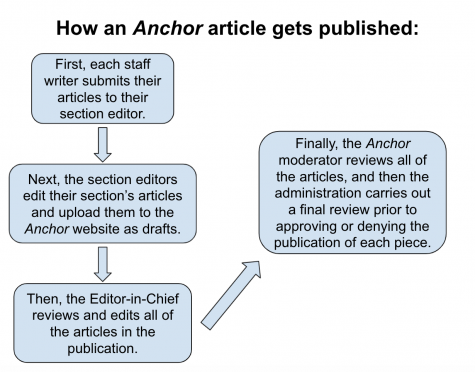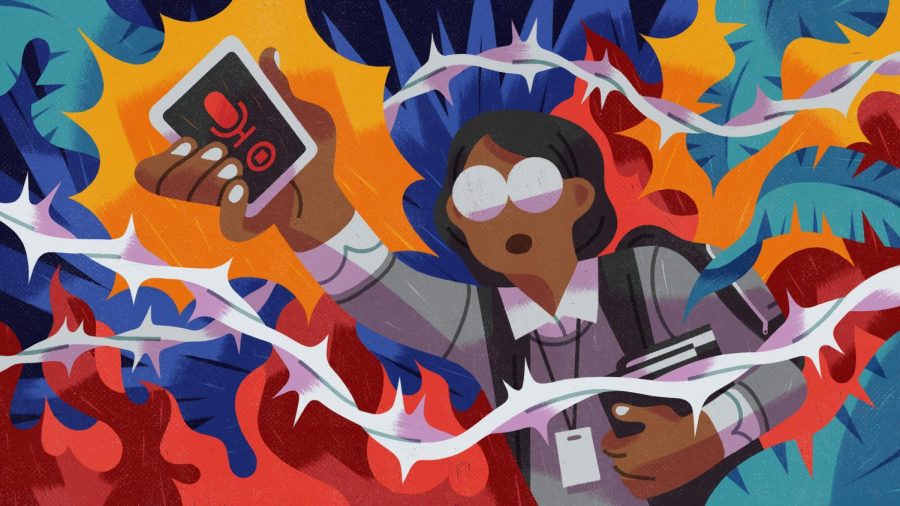Letter from the Editor
Illustration courtesy of Kelsey Borch
The Anchor is an online web publication created by the students of Marymount High School. The opinions expressed herein should not be interpreted as representative of those of the administration or faculty, or of the student body as a whole.
May 17, 2021
On a brisk Monday morning in January of 2020, I met with two members of our Model United Nations (MUN) team to finalize a report we had written about a new pathogen called the coronavirus. This document included our fictionalized musings about the potential implications this virus would have if it spread beyond Wuhan, China and throughout the world. Our report was designed to be presented to delegates as a crisis at our MUN conference scheduled for March.
As we wrote and discussed this once-little-known virus, we could never have fathomed that just two months later, the horrors, life-changing developments, and worldwide deaths we chronicled as fictional potential casualties of COVID-19 would unfold in real-time right before our eyes, resulting in mass devastation internationally, and derailing not only our MUN conference, but our high school experiences and lives at large.
Three months later, in the afternoon of Wednesday, March 11, 2020, I embarked upon the ever-strenuous hike from my AP Biology class in the bowels of Cantwell to the second floor of Butler for Religious Studies III. There, we sat embroiled in Kingdom Fair preparation. Murmurs about the ongoing pandemic and rumors of other local schools switching to virtual models permeated the stale classroom air. We reflected on an announcement that we had received at a class meeting that morning from our Dean of Students, assuring us that as of that moment, there were no plans to close our campus.
But suddenly, at 2:30pm, we heard raucous shouts of joy emerge from the hallway. We flipped open our laptop lids, refreshed our browsers, and read an email from the Dean of Students that would change our lives forever. In a stunningly-quick reversal, she announced that school was closed for the rest of the week and we would be transitioning to a Zoom model.
As I sit writing this one year later, I am reminded of the joy I felt in that moment, mired with the confusion and anticipation I felt as I contemplated what might come next. I knew we might get a few weeks off of in-person school, but if this was serious enough to the point we could no longer physically interact, how many people would this virus impact? How many lives would be lost? The ensuing year of 2020 was just as chaotic and terrifying as these questions, so in the midst of this constant, external instability, I found myself reflecting on my freshman year at Marymount.
At 10:50am on Monday, September 18, 2017, I attended my first Anchor meeting. I vividly remember feeling nervous and unsure of what to expect when taking a seat in B-201. I was overwhelmed by the sight of so many upperclasswomen; however, I had no understanding of the incredibly welcoming and supportive community that I was about to join.
After being a staff writer in ninth grade, I was selected as the Arts & Entertainment Section Editor as a sophomore, as the Assistant Editor-in-Chief during my junior year, and as the Editor-in-Chief as a senior. I am extremely grateful for the opportunity to be a part of such an incredible newspaper, and I am honored to have served as a member of the editorial board alongside such talented and hardworking students.
Throughout my years with The Anchor, I have grown tremendously as a writer and editor, and I have gained invaluable advice and mentorship from older students as well as our faculty moderator, Mrs. Hazell-O’Brien. I would like to extend my sincerest gratitude to everyone who has contributed to this program in any capacity.
However, I would also like to shed light on a process inextricably linked with my Anchor experience.
Every article we publish through The Anchor, is subject to a “prior review” requirement, through which Marymount’s administration must approve all articles before they are published. When writing articles, we never know for certain which topics administration will deem too controversial to publish.

This culture of ambiguity and censorship has a significant impact on what our staff writers are willing to devote time and effort to write about in the first place. The process of prior review has contributed to self-censorship among Anchor reporters when writing controversial articles, and sometimes, even before the article pitch and sign-up process. For example, many Anchor reporters will decide not to propose or pursue writing certain articles, feeling as though it could be a waste of their time to conduct research and craft a well-written article if Marymount’s administration won’t approve.
I myself have often found it incredibly challenging and frustrating when I have devoted a lot of time and effort writing a story, conducting interviews, and editing content, only for administration to enact prior review.
Press freedom is perhaps the most fundamental tenet of journalism. For the past four years, Marymount has taught us to speak our minds, advocate for ourselves, and “awaken a consciousness of social justice,” in accordance with the RSHM Mission. Yet, at the same time, Marymount’s has used prior review to censor its student journalists’ freedom of expression. This blatant contradiction begs the question: what is Marymount truly teaching its young women if it is not allowing them the agency and independence to craft their own stories or freely develop their own narratives to be published?
The Anchor is not an advertising tool, Marymount’s student reporters are not public relations professionals, and nor should they feel pressured to fill that role through administration’s constantly looming threat of prior review. The Anchor should be a vehicle for free student expression and engaging in an active, open dialogue with our school community—including the administration—surrounding local and global issues.
In my final month as Editor-in-Chief, I challenge Marymount’s administration to completely abolish the “prior review” process and publicly proclaim their commitment to real, unabridged student press freedom in order to allow all students to develop critical thinking skills, gain more insight into the reality of professional journalistic careers, and foster independent thinking, as Marymount’s mission professes.




Teresa Dickey • May 20, 2021 at 6:42 pm
Thank you, Sophia. The brilliantly written description that begins this piece made me think back to my last day in March of 2021. The confusion was real. Your comments are cogent and concise. The honest assessment offered at the end concerning the point of student journalism in high schools indicates that your post as Editor-in-Chief is well deserved. Congratulations on your acceptance to Harvard!
Margaret Brady • May 17, 2021 at 9:45 am
This is a very well written, well thought-out article! You make excellent points.
Amie B Kosberg • May 17, 2021 at 8:54 am
Nice job.